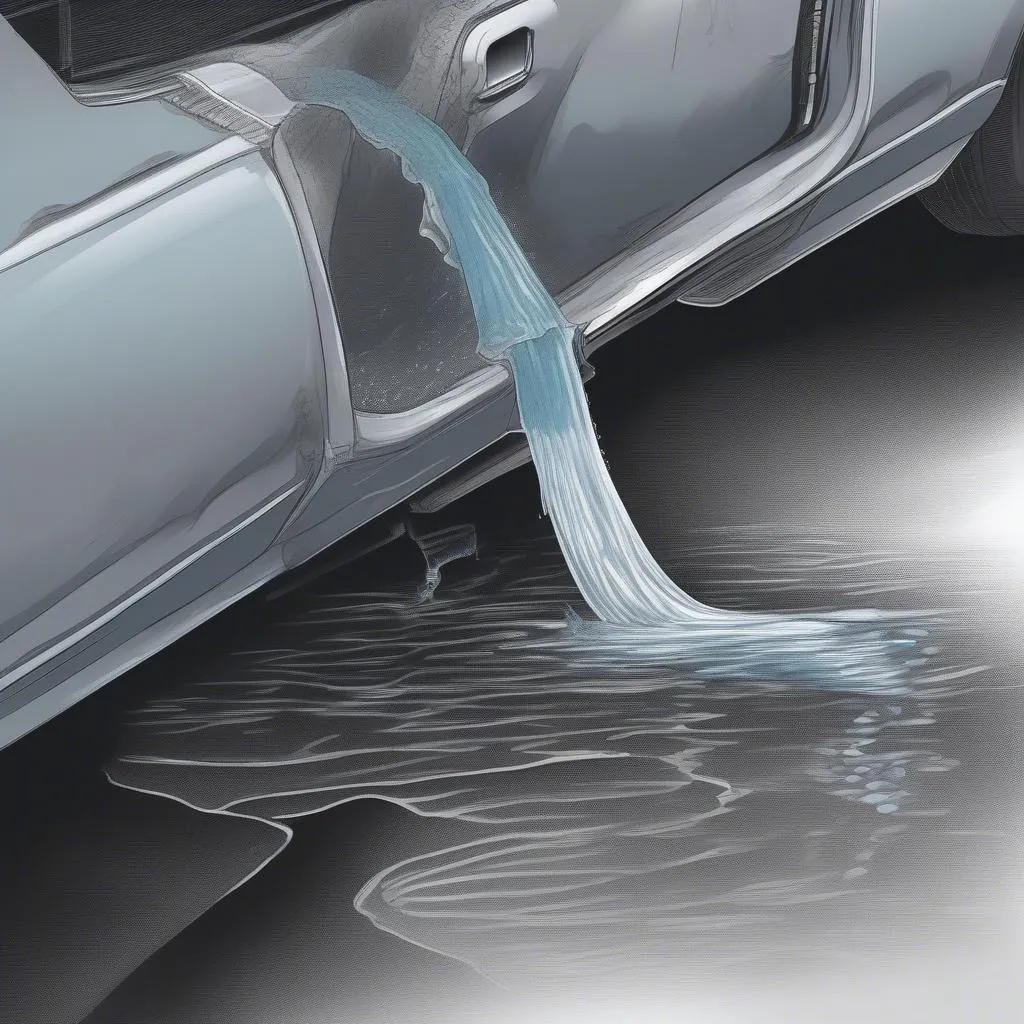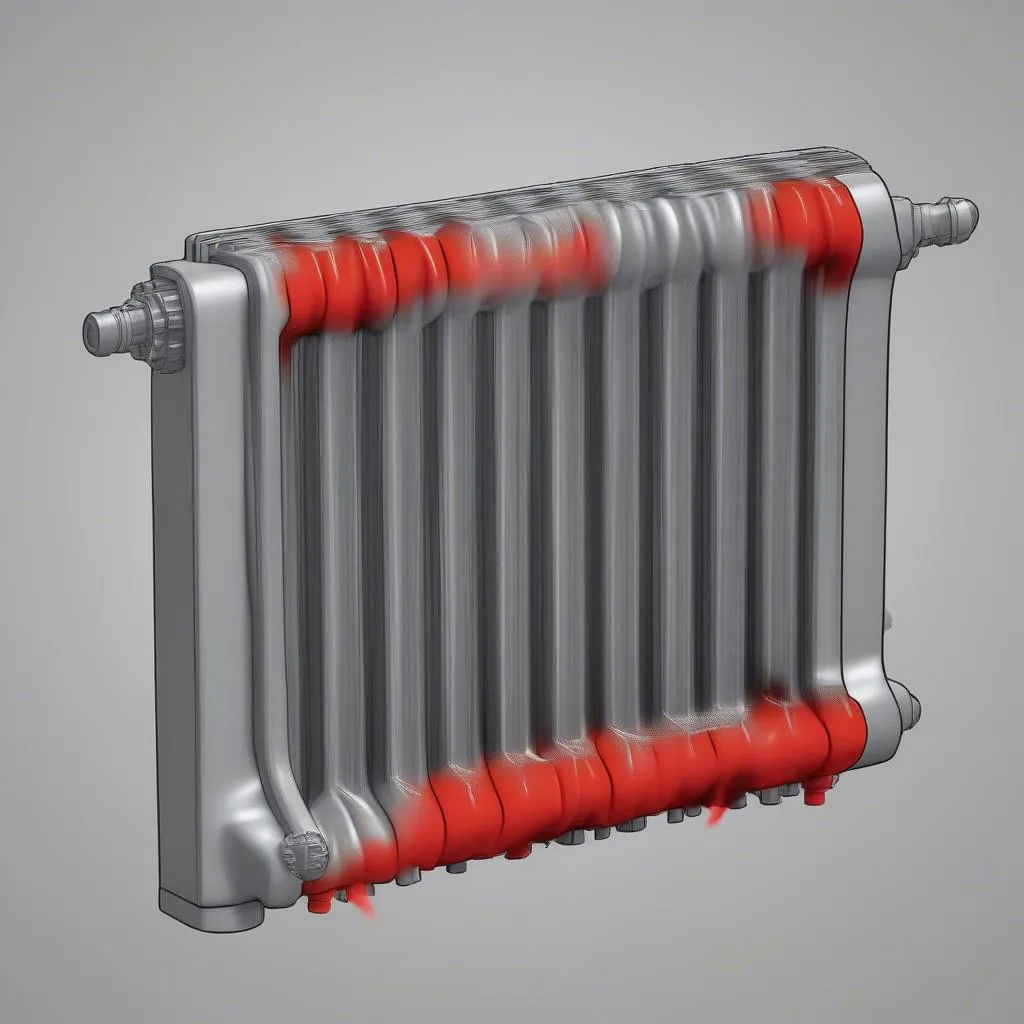Imagine this: You’re cruising down a sunny highway, enjoying the open road. Suddenly, the temperature gauge on your dashboard climbs ominously, like a thermometer measuring the heat of a scorching desert. You’ve just encountered a car overheating situation, a scary experience that can lead to serious engine damage if not addressed promptly.
Understanding Car Overheating: A Deeper Dive
Car overheating is a common problem that can affect drivers of all ages and experience levels. It occurs when the engine generates more heat than the cooling system can dissipate. This can happen for a variety of reasons, ranging from a simple leak in the cooling system to a more serious issue like a malfunctioning thermostat or water pump.
Why is Understanding Car Overheating Important?
From a Mechanic’s Perspective: Understanding the root causes of car overheating is essential for accurately diagnosing and fixing the problem. It allows mechanics to pinpoint the faulty component and ensure the cooling system functions correctly.
From a Technical Perspective: The engine relies on a delicate balance between heat generation and dissipation. Overheating disrupts this balance, potentially damaging components like pistons, cylinder heads, and gaskets.
From an Economic Perspective: Overheating can lead to costly repairs. Ignoring early warning signs can exacerbate the problem, resulting in more extensive damage and a higher repair bill.
Common Causes of Car Overheating:
Cooling System Issues:
- Low Coolant: The most common cause of overheating is low coolant levels. Coolant circulates through the engine, absorbing heat and transferring it to the radiator, where it’s expelled into the atmosphere. A leak in the system or a failure to regularly check and top off coolant levels can result in overheating.
 car-overheating-coolant-leak
car-overheating-coolant-leak - Radiator Problems: The radiator plays a crucial role in cooling the engine by releasing heat into the surrounding air. Clogged radiator fins, a damaged radiator core, or a blocked radiator hose can all hinder the radiator’s ability to do its job.
 car-overheating-clogged-radiator
car-overheating-clogged-radiator - Faulty Thermostat: The thermostat acts like a gatekeeper, regulating the flow of coolant through the system. A malfunctioning thermostat can prevent coolant from circulating properly, leading to overheating.
- Water Pump Failure: The water pump is responsible for circulating coolant throughout the engine. If the water pump fails, coolant won’t be able to flow, causing the engine to overheat.
Engine Issues:
- Faulty Head Gasket: The head gasket seals the combustion chamber, preventing coolant from mixing with engine oil. A blown head gasket allows coolant to enter the combustion chamber, leading to overheating and other problems.
- Overheating due to excessive oil: Too much oil in the engine can lead to overheating because it reduces the space available for coolant to circulate.
- Fan Problems: The engine cooling fan helps dissipate heat by drawing cool air across the radiator. If the fan fails or isn’t working properly, the engine may overheat.
Other Factors:
- Ambient Temperature: Driving in extremely hot weather conditions can strain the cooling system, making it more susceptible to overheating.
- Traffic Congestion: Sitting in heavy traffic can cause the engine to overheat, especially in warmer climates.
- Towing: Towing a trailer or hauling a heavy load puts additional stress on the engine, increasing the risk of overheating.
What are the signs of a car overheating?
You can often spot the signs of an overheating engine before it becomes a major issue. Here are some of the most common warning signs:
- Temperature Gauge: The temperature gauge on your dashboard is the most obvious indicator of an overheating engine. A rising temperature gauge usually indicates a problem.
- Steam or Smoke: If you see steam or smoke coming from under the hood, this is a sign that your car is overheating.
- Overheating Warning Light: Many cars have an overheating warning light on the dashboard. If this light comes on, pull over safely and let the engine cool down.
- Unusual Noises: An overheating engine may produce unusual noises, such as a hissing sound or a knocking sound.
- Rough Running: An overheated engine may run rough or stall.
What to do if your car overheats:
- Pull over safely: If your car starts to overheat, pull over to a safe location as soon as possible.
- Turn off the engine: Shutting off the engine will help reduce the heat buildup.
- Check the coolant level: If the coolant level is low, add more coolant to the reservoir. Be careful not to open the radiator cap while the engine is hot.
- Wait for the engine to cool down: Allow the engine to cool down completely before attempting to restart it.
- Call for help: If you can’t diagnose the problem or you’re concerned about further damage, call a tow truck or a qualified mechanic.
What are the most frequently asked questions about Car Overheating?
Q: Why does my car overheat in traffic?
A: Traffic jams can lead to overheating because the engine is idling, generating heat but not receiving enough airflow to cool it.
Q: How do I know if my car is overheated?
A: The most obvious sign is a rising temperature gauge on the dashboard. Other signs include steam or smoke coming from under the hood, an overheating warning light, and unusual noises.
Q: How can I prevent my car from overheating?
A: Regular maintenance, including checking and topping off coolant levels, ensuring the radiator is clean, and inspecting the fan belts, can help prevent overheating.
Q: What happens if I keep driving a car that’s overheating?
A: Continued driving with an overheating engine can cause serious damage to the engine, potentially leading to costly repairs.
Q: How do I know if it’s safe to drive after my car has overheated?
A: It’s best to err on the side of caution and have a qualified mechanic inspect the car before driving it again.
Need Help with Your Car’s Diagnostics?
If you’re experiencing car troubles, you’re not alone. At DiagXCar, we provide professional car diagnostics and repair services. Our team of experienced mechanics is equipped to handle any problem you might have, including overheating issues.
Don’t hesitate to reach out to us for a free consultation or if you need immediate assistance. We offer 24/7 support to help you keep your car running smoothly. Contact us via WhatsApp at +84767531508.
Let’s Talk:
Have you ever had a car overheating experience? What steps did you take to resolve the issue? Share your insights and experiences in the comments below.
Explore More:
- Learn about the importance of regular engine maintenance: https://diagxcar.com/engine-rumbling/
- Read about common car problems and how to troubleshoot them: https://diagxcar.com/auto-problem-diagnosis/
- Discover how to get urgent care for your Lincoln vehicle: https://diagxcar.com/urgent-care-lincoln/
Stay tuned for more informative articles on car care and diagnostics.


